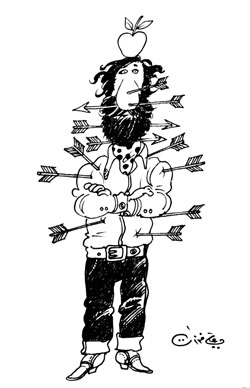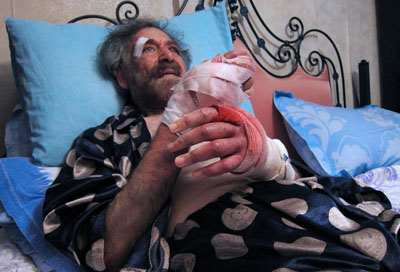Ali Ferzat likes to work through the night. His attackers knew that. Masked men grabbed Syria’s most famous cartoonist as he set out for home from his office near Damascus’ central Umayyad Square at around 5 a.m. on Thursday, and bundled him into a van. A few hours later, he lay in a bloody heap with a bag over his head on an airport road some 19 miles (30 kilometers) out of town.
Ferzat does not know who attacked him, according to friends I contacted who visited him in Al-Razi hospital after the assault. But it’s not hard to guess. The assailants stomped on his hands, breaking bones in his left hand. That’s the hand that holds the pen he has used to skewer President Bashar al-Assad who has unleashed tanks and even the navy, as well as Syria’s feared secret police, to quash political protests.
In a cartoon this week, Ferzat drew Assad on a roadside with a suitcase, trying to hitch a ride from a fleeing Muammar Qaddafi. The journalist has made a career out of debunking dictators. Saddam Hussein once threatened to have him killed.
The assault is being widely covered in the international media, and the U.S. State Department did not bother with diplomatic niceties in condemning the Assad regime and its thugs for the attack.
Why so much attention for one man when security forces have killed more than 2,000 people, according to human rights groups, since the uprising inspired by revolutions elsewhere in the Middle East began in March?

I think part of the answer is in the nature of the assault itself–the calculated crushing of something seemingly so fragile but actually so powerful as the hand that holds a pen.
Tyrants and criminals order the smashing of journalists’ hands as a warning to others who threaten their political power or corrupt enterprises.
Russian thugs broke the fingers of both hands of Mikhail Beketov in a vicious assault that almost killed the journalist whose environmental reporting threatened a lucrative highway project near Moscow.
Bangladeshi journalist and CPJ awardee Tipu Sultan has undergone multiple surgeries to repair his right hand since a local politician ordered it crushed so that the reporter would never write about him again.
Such attempts to destroy the instrument of free expression are themselves an admission of weakness.
In all these cases, the medieval barbarity of the reaction is evidence that the reporter or satirist has found his mark.
“The attackers targeted his chest, eyes, and hands, breaking them both, and told him that is what he deserves because of his irreverence toward his masters,” said one of the sources who visited Ferzat. They told him, “This is just a warning,” and said that breaking his hands would stop him drawing.
It is too soon to know whether Ferzat will take up his pen again, but his whole professional life has been one of challenging repression and injustice.
“The surprise now,” said one Syrian source, “is that the harsher the system, the more courageous people become and break the barrier of fear.”
